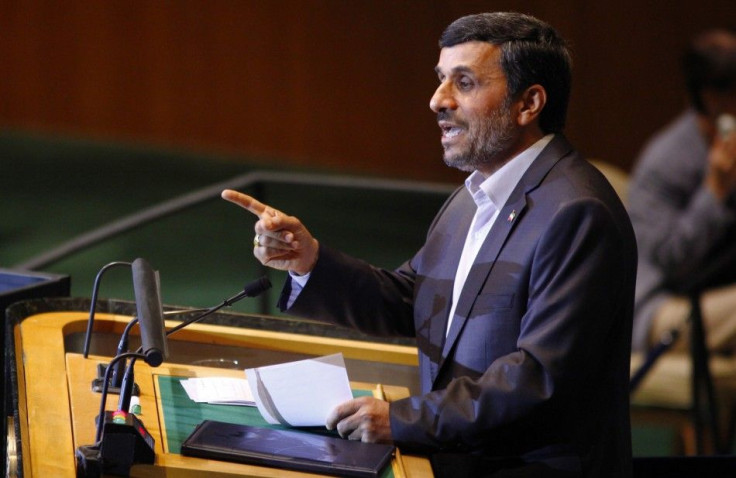Ahmadinejad United Nations Speech: 'U.S. Too Incompetent to Run World'
ANALYSIS

Iranian President Mahmoud Ahmadinejad's United Nations speech on Thursday angered a number of world leaders, especially the delegates from the United States, who walked out of the General Assembly while Ahmadinejad soliloquized.
The Iranian statesman alleged that the United States was and still is an imperialist, Zionist oppressor responsible for many of the world's wars. The most damning part of his speech (full text here) came as a series of rhetorical questions about a nameless world power who abducted forcefully tens of millions of people from their homes in Africa and other regions of the world during the dark period of slavery.
He also attacked NATO as a whole, alleging that the organization is a war-mongering hegemony that is responsible for causing more misery than it has abated. This, in a way, was actually his most salient point. He cited the fact that NATO and the United States are spending significantly more money on each of the wars in Afghanistan, Iraq and Libya than they are on humanitarian disasters such as the famine in Somalia.
Do these arrogant powers really have the competence and ability to run or govern the world? Is it acceptable that they call themselves the sole defender of freedom, democracy, and human rights, while they militarily attack and occupy other countries? Ahmadinejad asked the G.A.
Can the flower of democracy blossom from NATO's missiles, bombs and guns?
What Ahmadinejad didn't address, however, was Iran's record on the same humanitarian issues that he used to attack the United States. Iran actually is a significant contributor to Somalia, and has so far provided more than $25 million in aid and set up a camp in Mogadishu.
The United States has also pledge a significant amount to Somalia, but under the provision that the aid not be sent to any region controlled by rebel group al-Shabaab. Al-Shabaab is an al-Qaeda backed rebel group that controls most of the six areas in Somalia where famine has been officially declared.
However, Iran's humanitarian record is not clean either. Iran executes the second most prisoners of any nation and is also one of the few places to still sentence teenagers to death.
On Wednesday, 17-year-old Alireza Molla-Soltani was publicly hanged for stabbing Ruhollah Dadashi, a famous athlete known as Iran's Strongest Man.
“The execution of a 17-year-old is deeply shocking, particularly when carried out in public, which brutalizes all those involved, including those who witness it,” stated Hassiba Hadj Sahraoui, Amnesty International’s Deputy Director for the Middle East and North Africa on Wednesday.
Iran has held almost 100 executions in September alone, most, but not all of which, have been reported by the government. There have been about 400 total executions so far in 2011 in Iran, according to Amnesty, including the “retribution” sentences given to convicted murderers.
On of the most offensive parts of President Ahmadinejad's speech was his language concerning the Sept. 11 attacks. He referred to them as the mysterious September 11 incident, which was used as an excuse to kill and displace millions in two countries with the ultimate goal of bringing into its domination the Middle East and its oil resources.
He also criticized the killing of Osama bin Laden, who he thinks deserved a trial and an inquisition.
Ahmadinejad spoke for 30 minutes, but never mentioned the biggest United Nation's topic: Palestine's bid for statehood. He did, however, claim that the United States imposed, through deceits and hypocrisy, the Zionism and over sixty years of war, homelessness, terror and mass murder on the Palestinian people and on countries of the region.
© Copyright IBTimes 2024. All rights reserved.











